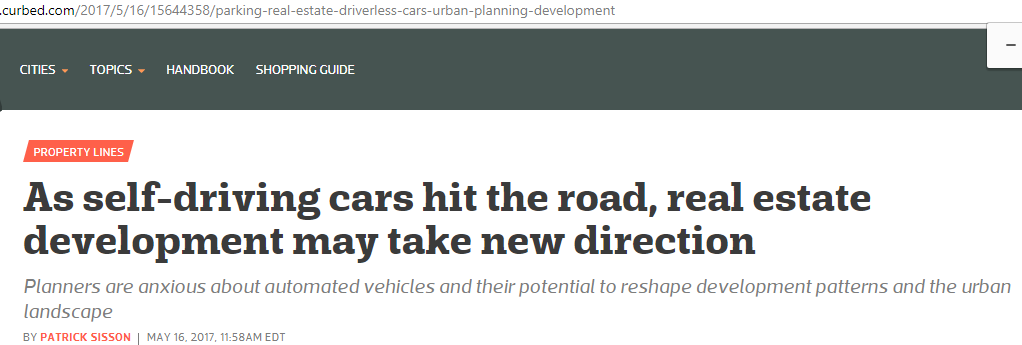How self-driving cars will profoundly change real estate
Key Points: Fewer parking lots In 2016, in the D.C. area, commercial underground parking garages added 10-12% to the cost of office construction according to CBRE, the world's largest commercial real estate service firm.
Fewer gas stations. "Think of all these gas stations. There are 125,000 gas stations in the United States in prime real estate, you won't need those anymore," said Andy Cohen.
 A recent policy brief by the Institute of Transportation
Studies at University of California, Davis, was even more clear. The
convergence of three new technologies—automation, electrification, and shared
mobility—has the potential to create a whole new wave of automation-induced
sprawl without proper planning and regulation.
Shannon McDonald, an architect, assistant professor at Southern Illinois
University-Carbondale, and an expert in future mobility
planning. "I
think it'll have the same transformational change as the introduction of the
automobile."
A recent policy brief by the Institute of Transportation
Studies at University of California, Davis, was even more clear. The
convergence of three new technologies—automation, electrification, and shared
mobility—has the potential to create a whole new wave of automation-induced
sprawl without proper planning and regulation.
Shannon McDonald, an architect, assistant professor at Southern Illinois
University-Carbondale, and an expert in future mobility
planning. "I
think it'll have the same transformational change as the introduction of the
automobile."
There are currently 263 million non-autonomous cars on the road, and roughly 2 billion parking spaces in the United States. "Streets are 25 to 35 percent of a city's land area… [the] most valuable asset in many ways," says Zabe Bent, a principal at transportation consulting firm Nelson/Nygaard But with the potential for driverless tech to reduce private car ownership, developers won't need to worry about parking spaces, and can make more money by avoiding wasting space on cars Redesigning parking lots and entrances to be less about static parking and more about increasing the flow of dropoffs and pickups.
- Parking lots and garages will become less necessary – if not obsolete.
- Cities will lower their parking requirements, thereby allowing developers to increase residential density.
- Neighborhoods that currently lack parking will become more attractive.
- Housing will become more affordable. The average parking space is only 330 square feet in size but can add anywhere from $10,000 to $50,000 per space to a development's total project costs
Our forecast is as follows:
- new-build residential property will become cheaper;
- detached houses on the outskirts of town with insufficient infrastructure will become less liquid;
- the demand for short-term rentals and hotels will decrease;
- the demand for retail property will fall, whilst the demand for warehouses will increase;
- warehouses will be built even further from city centers;
- parking spaces in business districts will be relocated closer to the periphery of cities.
Previously, see June 2017 NewsLetter
- Will automation affect the property market?
- If self driving changes people's attitudes to commuting, will that change the property market?
- Self Driving Cars and the shape of Cars
- Block Chain I/O – What Bitcoin Can Teach Automation
- High Temperature Superconductors
Coming Next
- Skills of the future
- Future proofing your career



